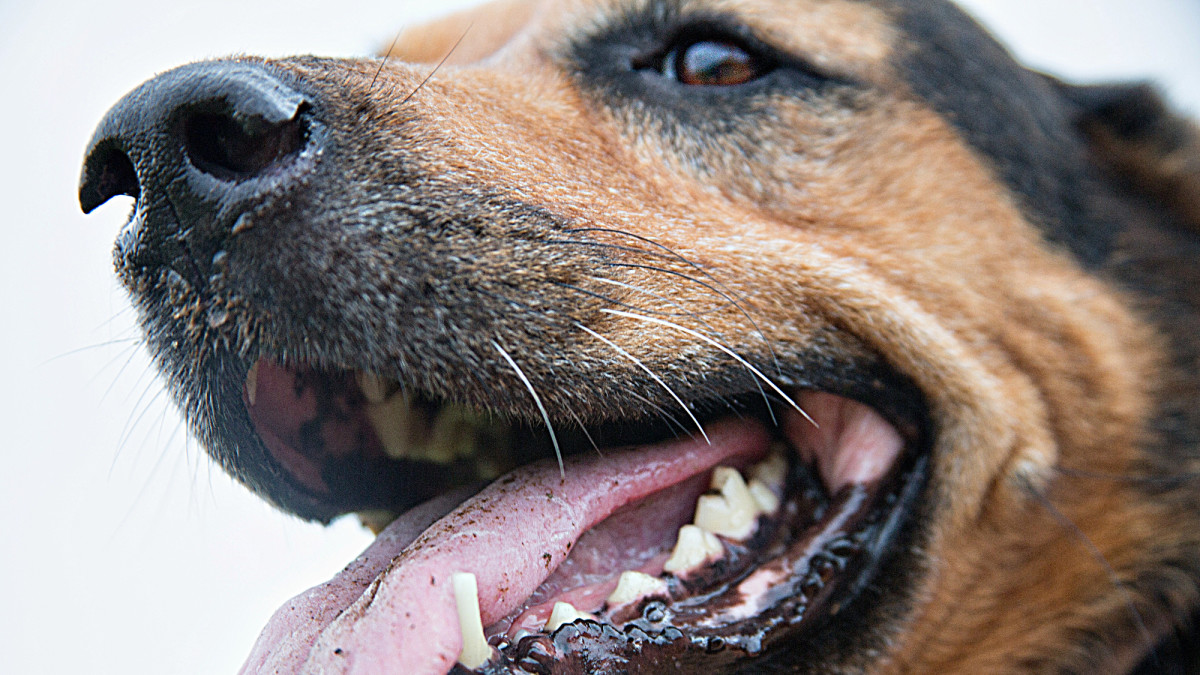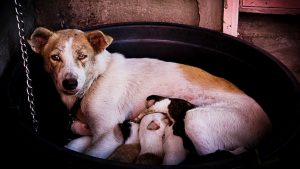
What Does a Sick Dog Smell Like? 14 Odors That Indicate Illness
My Dog Smells Weird
“I noticed a really odd smell coming from my dog the other day and was wondering if he is sick. Is there a way I can tell what is wrong from the odor?”—Rey
Odor as a Sign of Illness
Dogs are stoic animals and often hide their symptoms and do not act ill, so it is fairly common for owners to come in only after their dog starts to stink. It is usually because a dog smells like corn chips, rotten fish, or just bad breath. The things you are smelling are volatile organic compounds (VOCs) and normally are only present in parts per billion in your dog’s breath. (1) When they are higher than that, owners start to notice and realize there is something wrong.
There are several health issues that can be identified at home by the smell. Here are 14 odors your dog may emit and what they mean.
1. Dental Disease
An infection in the mouth is one of the most common reasons for complaints about bad smell. It may just be the smell of infection from a pus pocket, but when it becomes very bad, it smells like rotten flesh. Some dogs may have a swollen face and may have trouble eating, but others will have no visible changes and only have foul breath. A good exam, and maybe x-rays, is vital to find out why a dog like this smells so bad. If your dog has a rotten breath, the mouth should be the first thing you look at.
2. Kidney Disease
There are several different smells that come from the breath of a dog that has kidney disease. Some people describe a fishy odor, others a urine-like ammonia smell, and still others will notice a metallic smell to their dog’s breath. Even when the diagnosis is obvious from the smell, your dog will still need to be tested to determine what stage of kidney disease he has.
3. Diabetes
Dogs with sugar diabetes, or diabetes mellitus, end up producing excessive ketone bodies, and their breath smells like acetone or nail polish remover. (Some people complain that it smells like rotten fruit.) If your dog has this strong smell from the breath, he will most likely have other symptoms (weight loss, excessive drinking), so be sure to get him checked out as soon as possible if you notice this odor.
4. Liver Disease
Although most dogs with liver disease are usually presented with vomiting before the foul breath is noted, a strong odor of rotten flesh, or even a mild stale odor, is often noted by the time they are brought in.
5. Anal Sac Disease
This is one of the strongest odors, sort of like rotten fish. The dog most likely will have other signs, like dragging on the carpet or biting around the tail, but if you notice this smell, get him checked out as soon as possible.
6. Ear Infection
Many ear infections are a mixture of yeast and bacteria, but the yeast component is definitely the strongest smell. Yeast infections of the ears and skin often smell like corn chips, sourdough bread, and even stale beer. Even with the smell, most ear infections need to be swabbed to determine the most effective treatment.
7. Bacterial Infection of the Skin
These infections smell strongly, and sometimes, the type of smell can tell you which bacteria is involved. Some are strong, some are just kind of yeasty, and one of the most common (Staphylococcus) has a pus-like smell but not as strong as rotting flesh. If your dog has a skin infection and one of these odors, it will need medicated baths and may even need antibiotics.
8. Yeast Infection of the Skin
Besides licking his paws and scratching his ears, the strong, yeasty smell is often the first thing noticed with this type of skin infection. My article about yeast infections points out the many things that can be done at home when your dog smells of yeast, but it does not just come from the ears.
9. GI Infection
Some dog breeds seem to produce more noxious gas than others, but an infection after garbage consumption makes this much worse. I have written about seven of the strategies you can use at home to reduce the amount of gas your dog produces, and you can use them to reduce the smell.
10. Urinary Incontinence
Many dogs develop urinary incontinence when they get older, but it is all too common in female dogs when they are spayed very young. The exact number of dogs affected is still debated, but research shows that anywhere from 3 to 20 percent of dogs that are spayed develop this problem. (2) If your dog is young and healthy but smells like ammonia, this is more likely than kidney disease, but you will need to have the urine checked before putting her on medications for this condition.
11. Urinary Infection
An infection in the bladder may cause a dog to have urinary incontinence and smell like ammonia, but more commonly, people notice the smell when their dog urinates when out for a walk. Some families report a garbage smell; others will mention that it smells like fish, but when the urine is examined in the lab, it usually smells like ammonia or one of the bacteria listed among the skin infections. If you notice a strong odor when your dog urinates, even more than normal, she should definitely have her urine checked before the infection leads to a disease like kidney failure.
12. Pseudocoprostasis
This is fecal matter stuck to the hair and usually happens in long-haired dog breeds that are fed table scraps or eat garbage and develop diarrhea. The loose stool gets caught in the hair, sometimes even enough to block any stool coming out normally, and the skin underneath becomes infected and stinks like feces and a bacterial infection. If this is not addressed right away, flies are attracted to the smell and lay eggs that develop into maggots that will burrow into the dog’s skin. If you notice a smell like this coming from your dog, it needs to be taken care of right away (by bathing and clipping the dog to remove the feces), but if you cannot do so, take him to a veterinarian immediately.
13. Foreign Body and Cancer
In a puppy that likes to chew a bone or stick can be stuck in the mouth and lead to a patch of rotten tissue underneath the object. When the dog is older, it is better to look for abnormal growth, such as a tumor. Cancer just smells like normal growing tissue, but if it is growing fast, the blood supply becomes inadequate, and the cells in the middle of the tumor can die and start to smell like dead flesh. If your dog smells like rotting flesh, a good examination is the first thing to do.
14. “Wet Dog” Smell
This is not really an illness but something that comes up a lot when we discuss dog odors with clients. All of our skins, including those of dogs, are covered in bacteria but it is not even noticed. When a dog becomes wet, however, those bacteria release volatile organic compounds and start to smell. If you notice this smell, it does not indicate an illness.
Bottom Line
So yes, if you notice an unusual odor, you can tell there is something wrong. You will probably not be able to tell exactly what is going on, though, so your next step should be to take your dog to your regular veterinarian for an examination. He or she might find the problem right away just based on the smell, but your dog will probably also need X-rays, bloodwork, or a skin scraping to diagnose the problem definitively.
Sources
- Sharma A, Kumar R, Varadwaj P. Smelling the Disease: Diagnostic Potential of Breath Analysis. Mol Diagn Ther. 2023 May;27(3):321-347. https://www.ncbi.nlm.nih.gov/pmc/articles/PMC9893210/
- Kendall A, Byron JK, Westropp JL, Coates JR, Vaden S, Adin C, Oetelaar G, Bartges JW, Foster JD, Adams LG, Olby N, Berent A. ACVIM consensus statement on diagnosis and management of urinary incontinence in dogs. J Vet Intern Med. 2024 Mar-Apr;38(2):878-903. doi: 10.1111/jvim.16975. Epub 2024 Jan 13. PMID: 38217372; PMCID: PMC10937496. https://www.ncbi.nlm.nih.gov/pmc/articles/PMC10937496/
This article is not meant to substitute for diagnosis, prognosis, treatment, prescription, or formal and individualized advice from your veterinarian. Animals exhibiting signs and symptoms of distress should be seen by a veterinarian immediately.
© 2024 Mark dos Anjos, DVM


